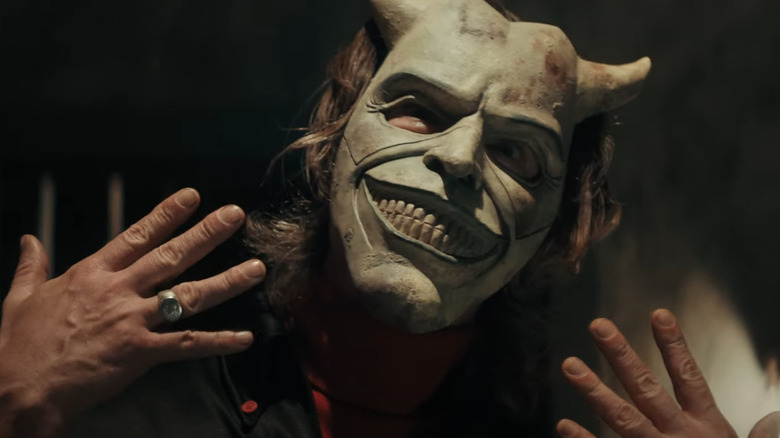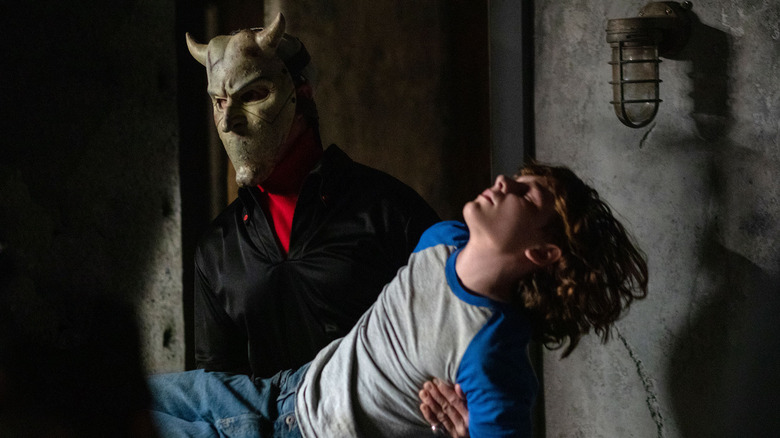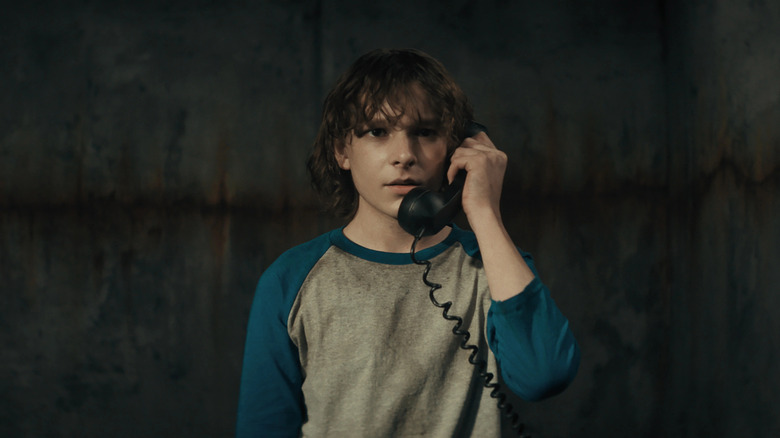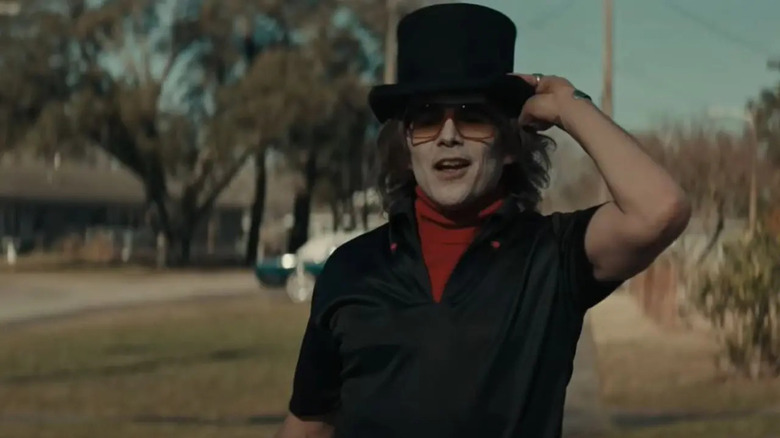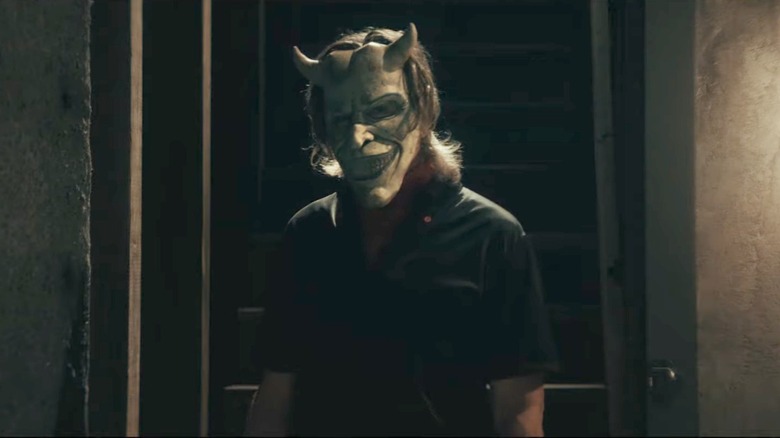The Black Phone Director Scott Derrickson Knows Horror Is All About The Timing [Interview]
The best thing I can say about "The Black Phone" is that I saw it nine months ago, at its world premiere at Fantastic Fest 2021, and its spooky strength still lingers in my mind. Now, after several pandemic-related delays, director Scott Derrickson's return to the horror realm (after a trip to the Marvel Cinematic Universe with "Doctor Strange") is nearly upon us, and audiences are in for a treat. As you'd expect from a movie directed by the filmmaker behind "Sinister," "The Black Phone" is scary — but it's also a great time at the movies. Between the scares, beneath the grim exterior, lies the beating heart of a classic coming-of-age movie. You know, just one that happens to take place in the basement of a serial killer where a young man (Mason Thames) fights for his life against the masked madman (Ethan Hawke) who has abducted him. The marketing may play up the scares (and the creepy mask worn by Hawke's chilling villain), but the film's sense of humor and message of resilience in the face of despair is just what the summer movie season ordered.
I recently sat down with Derrickson over Zoom to talk about the making of "The Black Phone," the hunt for the perfect child actors, teaching Ethan Hawke how to act in a horror movie, how his faith informs his filmmaking, and so much more.
'I had just never seen that done effectively in any kind of way'
I saw "The Black Phone" at Fantastic Fest last year, and the audience went crazy for it. So I just have to know: What's it like to have that screening and then sit on the film for eight months? How has that felt?
I've watched it with an audience five times. Two test screenings and three public screenings. And yeah, it's tried my patience a little bit. I've been anxious for the world to see it, but now that moment is upon us. So it was worth waiting. The summer date is a good date.
I'm wondering about your first exposure to writer Joe Hill. Was it "20th Century Ghosts," or did you find him another way?
I read that book the month that it came out. I just wandered into a local bookstore and checked out the new horror section, and I picked that book up and read the first story in it, thought it was brilliant, and bought the book. And I had "The Black Phone" in my head as a possible movie ever since. I thought it was the most adaptable of all those short stories.
What about stood out to you? What about this story? What grabbed you by the throat, to use a cliche?
What I think is really deceptively brilliant about that story, something that it's easy to miss, is the fact that it combines a serial killer story with a ghost story. And I had just never seen that done effectively in any kind of way. But also, Joe's writing is really unique. He has an ability to take on the darkest subject matter. I mean, what could be darker than a sadistic child killer abducting a 12-year-old? And yet, the story is so full of empathy, and really told from a point of view of love and hope, and I found that to be also really remarkable.
In the years between when you read it and when you made it, what were some of big changes and additions that you knew had to be made? Were you visualizing the story as you read it?
Nothing visual. It was really the tone. I knew that if I was going to try to adapt it, I was going to try to hold onto that combination of the very scary, the very dark, even the very grim, and a kind of hopefulness and just a point of view of empathy and love. That to me was the most remarkable thing about the story. And I thought if I could pull that off in a feature, it would be special. It would be a unique experience for the audience.
'I think his performance is literally flawless'
One of the surprising things about "The Black Phone" is that it's an audience-pleaser. It's a scary movie, but it's exciting. You root for the kids. Can you talk about finding that tone, and realizing that the movie may have more in common with a coming-of-age movie than maybe a traditional horror movie?
I know that [author Joe Hill] showed it to his dad. And Stephen King's comment — he saw it and apparently loved it. And his comment to Joe was, "It's 'Stand By Me' in hell," which I thought was great. I think that should be on the poster. I think that it's all about the truthfulness of those young kids, of Finney and Gwen. And creating these child characters, and realistically, in a grounded way, portraying the fact that they live traumatic lives, and they have to deal with a lot of personal trauma in their day-to-day life. And they're dealing with their own monsters when the real giant monster shows up and takes Finney. And I felt that the heart and soul and emotion of the movie would be reliant upon how well I could establish, not just their individual characters, but the bond between the two of them, and make the audience really root for their connection, and that would sustain the emotion of the movie.
The kids, the two lead kids in particular, are fantastic. I know Ethan Hawke's all over the posters, for good reason. It's a great mask. He's a big name. But those kids sustain the film. Can you talk about finding them and working with them? Casting the wrong kid actor can destroy a movie.
Yeah, no kidding. I mean, boy, did I ever feel the weight of that burden. I mean, I really did. So I took a lot of time in the casting. And really, almost ran out of time looking for Finney. And I really got lucky in finding him at the last minute. Madeleine McGraw, who plays Gwen, I found her fairly early. She was doing a Disney show, she had representation. They sent in her audition tape and I was like, "Oh my God, that's Gwen." She was just remarkable. And I felt so strongly about her being in the movie that I was told I had to recast her, because during — we were supposed to shoot in the fall, and her Disney show had shut down for Covid and then ramped back up in the fall. And they said, "We have to recast Madeleine McGraw." And I called [producer] Jason Blum and said, "I'm not making this movie without that kid. She's got to play Gwen." And Jason, to his credit, let me move production until January. So she was worth it.
But Finney, I saw hundreds of tapes. And it wasn't until I saw [Mason Thames] pretty close to production that I saw a raw talent in the self-tape that he did. I think he was living in Texas at the time. They were auditioning kids from public schools, and stuff like that. And I did several callback auditions with him where I worked with him via Zoom. And I just realized this kid has more raw talent than any young actor I've ever seen. He just needs to be directed, needs to learn how to do this. He'd never been in a feature film before. And I have to say that cutting the film together, I don't think he misses a beat. I think his performance is literally flawless. It is a perfect portrayal of Finney under the duress that he's under.
It's wild to think of this movie without that version of Gwen, because the movie is grim by design, but that character is so funny. Just when you think the movie's going to get too dark, she pops up.
Well, her description in the script, the scene when she walks into the kitchen in the opening, the scripted line in the screenplay was, "Gwen is the sunshine in the apocalypse." And that's kind of how she functions through the whole movie.
'Oh, I get it. Horror is like comedy. It's all in the timing.'
This is your second movie with Ethan Hawke. Have you two developed a shorthand? Between "Sinister" and this, how has your trust in each other evolved?
Well, it was two things. First of all, the experience of "Sinister" was a really positive one for him. He had never done a horror film before, and I think he really realized on set that he didn't really know much about how to make a movie like that, and the distinctiveness of timing. Now, I remember shooting the scene when he walks down the hallway and finds his son in the box. And I was like, "No, you got to go slower, stop here. Then take a few steps. Stop here." And I remember him going, "Oh, I get it. Horror is like comedy. It's all in the timing." And I said, "Yeah, exactly." And so we made a good film, and I think he's really proud of that movie.
But he's also just personally my favorite actor that I've worked with. So we stayed friends. We stayed in touch and would text occasionally. And I went and saw him in New York one of the times I was out there. And so when I offered him the role, he told me, he said, "I probably won't do it. I don't do villains," which didn't really occur to me, but he really doesn't. But he read the script and loved it and said, "Yes."
Yeah, there's a real fairy tale element to The Grabber where you don't get his extensive backstory. You only learn the bare details. He exists as a force of nature. And when I talked to Ethan, he said that he deliberately did not base it on real experiences or real people. He wanted to feel like an ethereal monster. Was that how you always pictured him, too?
Yes, because I think that he's meant to be a realistic monster. He's meant to be one of the monsters that are out there in the world. And you look at these guys, Ted Bundy had a happy childhood, and Jeffrey Dahmer had really nice parents. And so the idea of giving him some backstory that sort of explained why he is the way he is was ridiculous to me. I felt like he needed to be a mystery. And that the power and danger of him would be in the mystery. And to me, the best screen villains are like that. You don't know why Hannibal Lecter eats people in "Silence of the Lambs." You don't know why Heath Ledger's The Joker ... [does Heath Ledger impression] You don't know how he got those scars. He just tells these lies about it, and that makes him more frightening because of the mystery of evil that's before you. The power is in the performance. The power is in the uniqueness and the peculiarity of what they do.
For as long as I've followed your work, you've openly discussed your faith and your beliefs. And I feel like this has really figured into your work, from the big movies to the small movies, and especially in your horror movies. Many directors use religious symbolism and faith as a prop to sort of say, "Oh, here's what good versus evil looks like." But I feel like, in your work, the idea of a prayer or the idea of hope has real power and real weight. Can you discuss how your beliefs have affected your work in the horror genre?
Well, yeah, I think that my beliefs are ... I almost hesitate to even call them beliefs. They're my experience of the world. Before I would call myself religious, before I would even call myself Christian, I would call myself a mystic. And since I was born or since my earliest memories, I just experienced the world as more than the material, and it feels that way to me — it is that way. And I think I'm perceiving things that a strict materialist is just missing and isn't being sensitive to. And so the films that I've made are trying to reflect the power and meaning of being able to view the world that way, and to be able to be open enough to experience it that way.
I think the world is a really magical place, and it is a dangerous, adventurous place if you have an openness to believe that there is much more to life than just the strictly material. And I think that movies really give audiences a taste of that. Even if you are a strict scientific materialist, and you don't believe in anything but what can be measured, and there is no God, there is no spiritual plane, there is no other side, there's nothing after death — fine. You still have a mystical, magical experience when you see movies that capture that well. And so for me, I think it is a through line in my movies. I think that's the most exciting thing about life, and it's the territory where I think the most interesting stories that I can tell exists. So it always finds its way in.
'What scares an audience more than anything is not what you put in front of their eyes, it's what you can put in your mind'
Another thing that stands out is that the '70s setting, the Pink Floyd needle drops. There's a real sense of time and place in "The Black Phone." How important to you was it to establish this grim setting, this crumbling America, before we even get to kidnapping?
It was very important. I had thought about Joe's story for a long time, over 15 years I was trying to do it. And I had given it to my writing partner Cargill, and he loved it too, but it's a short story. And it's almost like the second act of a movie. It didn't have developed characters. It didn't have an evolved conclusion. And so I didn't know how to expand it into a story. And when the time came, toward the end of working on the sequel to "Doctor Strange" and then stepping off of it, I had been in therapy for three years dealing with the traumatic nature of my own childhood, and just the violence that I experienced, and violence in my home and my neighborhood, the bullying, just the kind of place that I grew up.
And I felt that I could take all of that and merge it with Joe's story, and have something really powerful. And that the idea of ... I mean, I think the most terrifying difficult scene to watch in the movie is the whipping [a scene in which the lead character is abused by his own father], and that happened to me all the time as a kid, and a lot of other kids in my neighborhood. That was pretty standard for that time, for the late '70s. And so the idea, ultimately, of making a movie about childhood trauma and the resilience of children became — it's a horror film and a coming-of-age film.
We ran an article on our site a little while back about a scientific study to find the scariest movie of all time, and "Sinister" topped that list. And when the horror experts on my site put their brains together to make a list of the scariest scenes of all time, trying to take it very seriously, the lawnmower scene in "Sinister" was number one. I was at the premiere of "Sinister" at SXSW. I remember jumping out of my seat at that moment, and realizing I was seeing maybe the scariest scene of all time. I still feel that way. All these years later, how does that scene sit with you?
The fascinating thing to me about that scene is that its power is purely cinematic. It's time and motion. And what you don't see ... you see the lawn mower, it's very dark, you can't see anything around it. And it goes on for a long time, and you can just feel that something really bad is going to happen. And it's like you know it's coming, you know something's coming, you really don't know what. And when it does come, it's still very, very shocking. And I think that the power of that is not only in the duration of the build-up and then the shock of the body, the lawnmower tilting up and hitting the body, but it's what it immediately makes your imagination do. Because we don't show the body getting ravaged by the lawnmower, but you sure see it in your mind's eye. You can't help it.
And so there's something about the effectiveness of that scene that is the key to a lot of effective horror, which is how it plays on as a combination of sight and sound, what's on screen, what's in the soundtrack, because it's nothing but a very soft, menacing beat, piece of music that's playing — that's it, and the audience's imagination. What scares an audience more than anything is not what you put in front of their eyes, it's what you can put in your mind.
Are you planning to stick with horror for a bit? I know you had that Bermuda Triangle movie in the works. What's going on with that? What's the future for you?
I can't talk about what's next. I have a lot of things going on. I think I know what I'm making next, but all of it's good. It's all genre. Some of it's horror, some of it's not. I will always have a love for horror. I think I have a knack for it, and should probably keep doing that. But anything that involves action, thriller, horror, sci-fi, that can be both highly entertaining and artful, and hopefully progressive and new in some way is going to be of great interest to me.
"The Black Phone" hits theaters on June 24, 2022.
